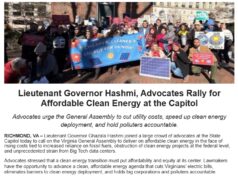
Last week I called it a pig of a bill, because calling it a dog was too nice. The SCC must agree, because they just gave us the dirt.
The State Corporation Commission just weighed in on this year’s boondoggle legislation Dominion Energy concocted with Senators Dick Saslaw and Frank Wagner, and they are not happy.
Recall that when last we looked, eleven senators had sent a letter over to the SCC asking about effects of the legislation on ratepayers. The SCC responded with the kind of alacrity we do not customarily see from them, for example when we have to wait a year to get a decision on a case, and then get an order that avoids answering the important questions. This time it appears they were just waiting for the chance to make it very, very clear, they do not like this legislation.
Here is how the SCC answered the opening question:
Q: In general, how can the likely effect of SB 966 and SB 967 on ratepayers be summarized?
A: As explained in greater detail within this document, the key impacts on ratepayers can be summarized as follows:
- There will be no opportunity to consider base-rate reductions or refunds to customers for at least six years, and then only if the utility over-earns for two consecutive three-year periods effectively extending the current base-rate freeze further into the future.
- There may be only a partial return of the reduction in federal income taxes currently being collected in base rates.
- The provision in current law that allows utilities to keep more than 30% of their excess earnings is continued.
- The legislation allows the utilities to keep future excess earnings (i.e. customer overpayments) and, rather than return them to customers, use them for capital projects chosen by the utility. In addition, the utilities can charge customers for these same projects in base rates.
- The legislation deems certain capital projects to be “in the public interest,” thus impacting the SCC’s authority to evaluate whether such projects are cost-effective or whether there are alternatives available at lower costs to customers. This provision could potentially result in billions of dollars of additional costs that will be charged to customers in higher rates.
- An amount that appears to represent the customers’ portion of prior period excess earnings is returned to customers, but the amount has not been examined in a formal proceeding to determine its accuracy.
Answers to other questions mostly reiterate what a great deal this is for the utilities and what a terrible deal it is for ratepayers. Liberal use of underlining prevails throughout. But there is one answer I just have to reproduce here because it shows how truly ingenious the rip-off is:
Q: If customers’ refund money is reduced by distribution grid transformation and renewable generation projects (“Projects”), are the Projects considered paid in full?
A: No, under the legislation if the utility has spent money on Projects, customer refunds will be reduced by that amount and base rates will recover the same amount with interest and profit margin.
For example, suppose the SCC determines after two Triennial Reviews that customers are owed a refund of $100 million. Assume further, that during the six year period of the Triennial Review, an electric utility spends $100 million on distribution grid transformation investment. As a result, customer refunds are offset by this utility spending (customers would not receive any refunds). Then, customers will pay the full $100 million for these distribution grid transformation projects, plus interest and a profit margin, through base rates. Effectively, customers are more than $200 million out of pocket ($100 million lost refund + $100 million paid through base rates + interest/profit margin) for these $100 million of new distribution grid transformation projects.
Wow, get that? Dominion can charge customers for a project in order to spend enough money that it avoids having over-earnings. Having done that, it can then charge the customers for the same project all over again, and this time add a percentage for profit and another percentage for interest.
Come on, that’s impressive. I could never have come up with anything so devious and underhanded. I can’t even follow the money. Heck, I bet there isn’t a legislator in the General Assembly who could have figured out the tricks in this legislation!
We can only assume that was exactly the point. But now that the SCC has uncovered the tricks and laid it out for all to read how extraordinarily bad this bill is for consumers, Dominion, we hear, is making some concessions. Saslaw promises a new version next week.
My advice? Read the fine print.


![VA DEQ: “pollution from data centers currently makes up a very small but growing percentage of the [NoVA] region’s most harmful air emissions, including CO, NOx and PM2.5”](https://bluevirginia.us/wp-content/uploads/2026/01/noxdatacenters-238x178.jpg)








